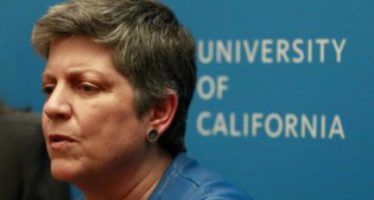Pension 'pain train' coming
JULY 8, 2010
By KATY GRIMES
California’s private sector employees are not only paying for their own pensions and retirement funds, they are paying for the pensions of public sector employees, according to Governor Schwarzenegger. In his pension fund roundtable meeting today Schwarzenegger said, “We don’t have enough money,” to continue funding the state’s public pension fund liability.
California has $500 billion in unfunded pension debt – that’s half a trillion dollars. Even if the state froze pensions today, California would still be upside down in pension debt by billions of dollars.
According to roundtable participant San Francisco Public Defender Jeff Adachi, “San Francisco pays $1.2 billion every year for the city employees’ pensions and health care, but has cut summer school, gives out $80 parking tickets, and we charge people to come to our parks.” Adachi said that when he was elected, he analyzed the budget and asked, “Where is all the money going?” He said that when no one could answer him, he started doing his own research and discovered that the city employee pensions cost 28 times more than what the city spends on street repairs and maintenance.
Adachi has introduced a ballot initiative that would require city workers to contribute 9 percent to 10 percent to their own pensions, and double their contributions to dependents health care coverage from 25 percent to 50 percent. Adachi, a self-described progressive, said his initiative gathered 75,000 signatures when only 3,000 were needed, demonstrating vast support for the change.
In 1999, the Legislature passed SB400, to retroactively increase pension benefits by 20 percent to 50percent, authored by Democrat Sen. Deborah Ortiz and coauthored by Democrat Sen. John Burton, and Assembly members Lou Correa, D-Santa Ana, Anthony Pescetti, R-Sacramento, and Darrell Steinberg, D-Sacramento. Gov. Gray Davis signed the bill. Some state political analysts said the bill was a gift to unions for putting Democrats back in charge of the state after 16 years of Republican rule.
Governor Schwarzenegger is proposing a roll back of pension benefits to pre-1999 benefit levels. He wants to require employees to contribute to their own pensions, base the retirement rate on the three highest years of wages of employment instead of the one-year calculation now used, and require full disclosure by state pension funds and “honest funding of pension promises when promises are made.”
At the meeting, the governor’s special jobs and economic adviser David Crane, said that SB400 was only supposed to cost $648 million in the 2010-11 budget year however, the actual cost will be nearly $4 billion, 2,000 percent higher than 10 years ago. The projections were based on assumptions that the stock market boom in the 1990s would continue indefinitely. Crane said that the California Public Employee Retirement System (CalPERS) believed it could cover any additional costs through “continued excess returns” and expected that contributions from the state would hold steady at $350 million. Crane explained that the actual pension costs began at $145 million in year 2000, and are $3.8 billion this year. He said however, that the increases started well before the stock market crash of 2008, and that the CalPERS Board signed off on the pension changes without ever asking questions about how it could possibly be sustained.
CalPERS Board member Tony Oliveira said the biggest problem was that SB400 passed without any scholarly analysis. “Now the pain train is still coming, and locals are going to take it on the chin.” Oliveira said that his own county will be experiencing 35 percent increases.
Former Democratic Assemblyman Joe Nation (2000-06) and co-author of AB32, California’s global warming act, said that he was not in the Legislature in 1999 and did not vote for SB400, “however had I been, I probably would have because every other Democrat did and most Republicans did – because they didn’t even think about it.” Nation said, “You cast votes because it’s what the caucus recommends.” Nation added, “We need to step back and think about things, look at the facts. Facts are pretty stubborn things.”
Nation is correct – SB400 was supported by both parties, passed unanimously in the Senate, with only seven members of the state Assembly voting against it.
Crane was critical of the Legislature and questioned why not no one asked, “What happens if the stock market doesn’t continue to go up?” Referring to the dot.com and stock market boom of the 1990s, and the assumption that it would continue, Crane said the assumptions were entirely based on the Dow Jones rising. However, according to Crane, if the stock market doesn’t perform at the 1990s boom level, even with a rise, pension costs will still be higher, “even worse than these costs.”
Sen. Dennis Hollingsworth, R-Murrieta, tried to address the existing pension crisis by authoring SB919, however it was voted down along party lines. The measure would have increased the retirement age from 55 to 65, and required state employees to make higher contributions to their retirement accounts. The measure would also require retirement benefits be based on the three highest years of wages, instead of the using only the current highest single year.
Explaining that there once was a time when there were trade offs between higher paying private sector jobs and better benefits in public sector jobs, Hollingsworth said that today the public sector benefits are much greater than the private sector in both areas. But Hollingsworth stressed that the argument is that “pensions must be sustainable.”
Northwestern University Professor Joshua Rauh, author of The Liabilities and Risks of State-Sponsored Pension Plans … explained the dire financial situation of the state’s pension crisis, and how easily the pension funds got into trouble, because of lawmakers’ and board CalPERS members’ unrealistic assumptions about the stock market.
Rauh said that policy makers need to understand the facts and warned that with current pension promises, CalPERS and CalSTRS will run out of money by fiscal year 2026-27.
The governor told Rauh, “[G]ood luck making policy makers understand what you just said.”
Related Articles
University of California finances shakier than cut in tuition implies
Last week, University of California President Janet Napolitano (pictured) and UC regents generated positive headlines with their decision to reduce tuition for
Sacto's Measure B Big For State
OCT. 14, 2010 By KATY GRIMES City utility department increases are occuring all over the state. But in Sacramento, the
2nd Amendment groups fight CA gun-control laws in court
As fast as California lawmakers can write new gun-control laws, Second Amendment groups are challenging them in court. buy definition essay




